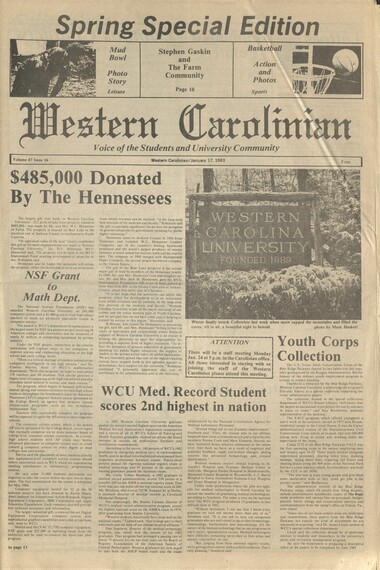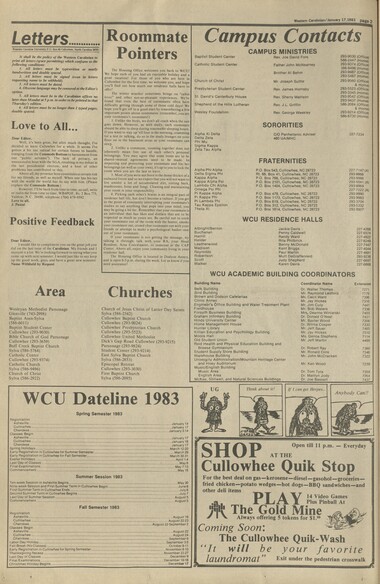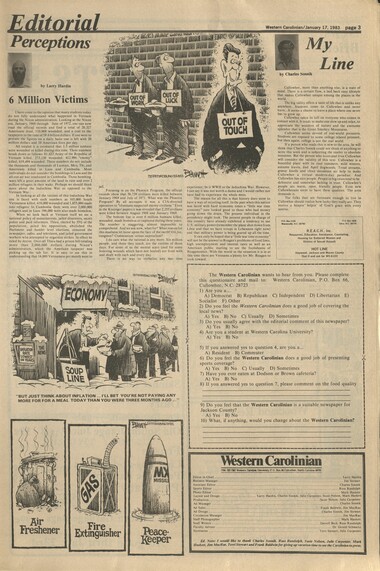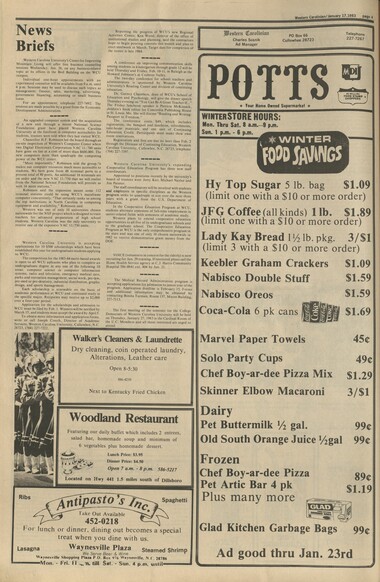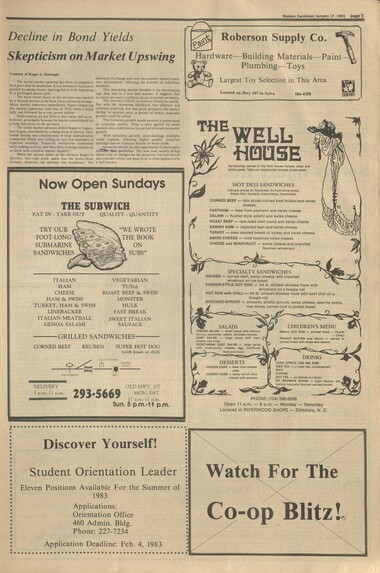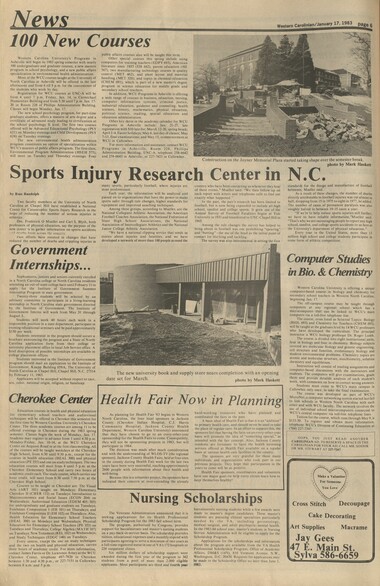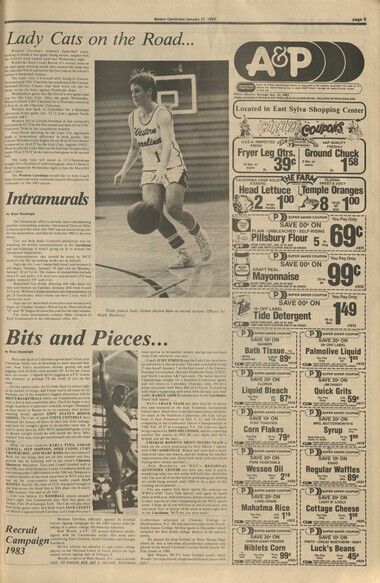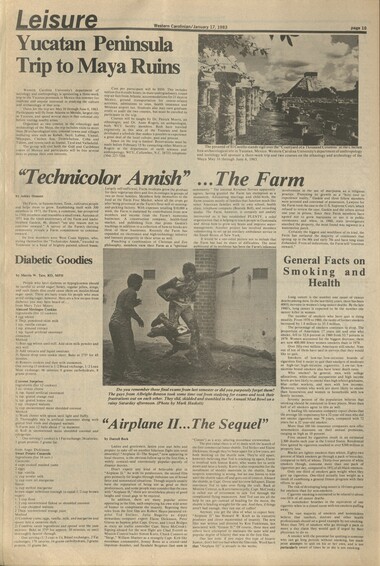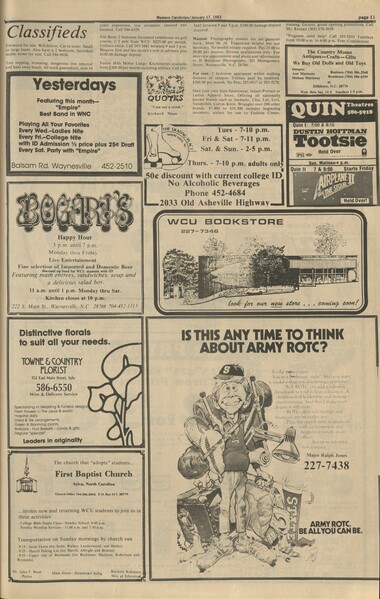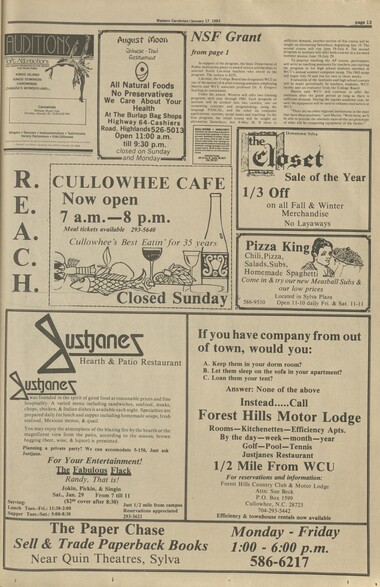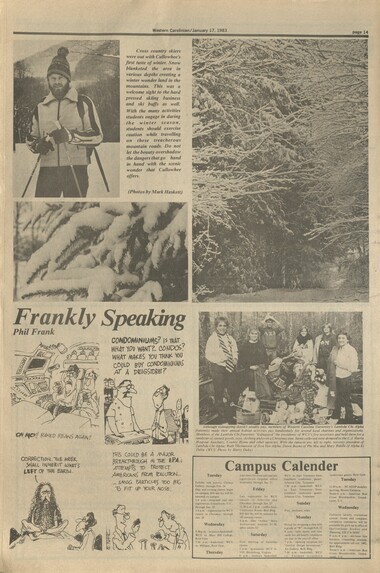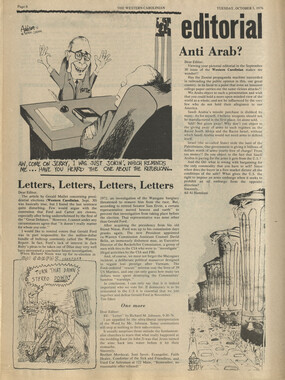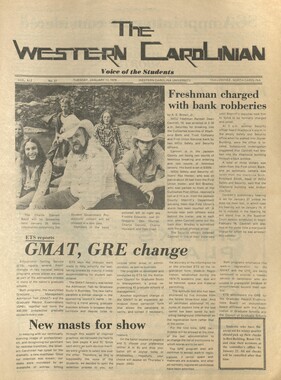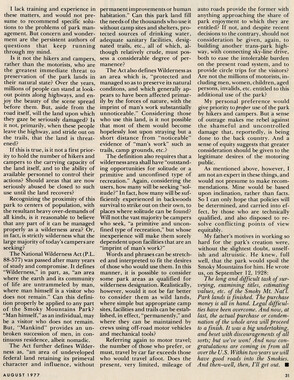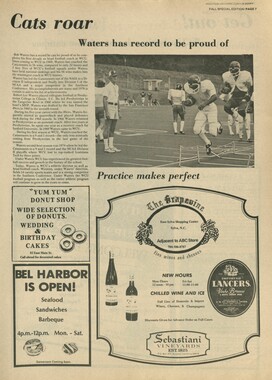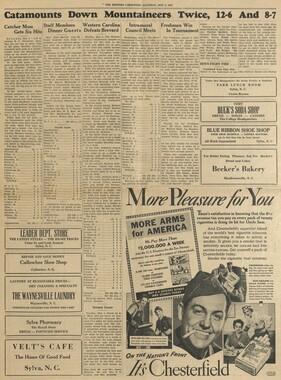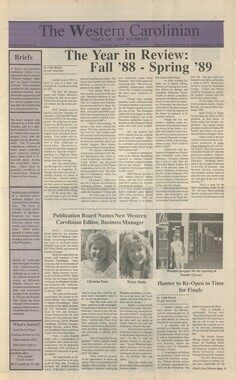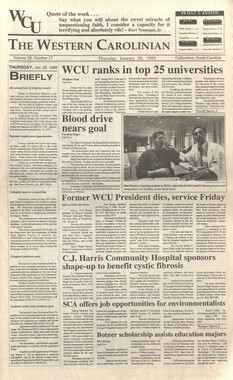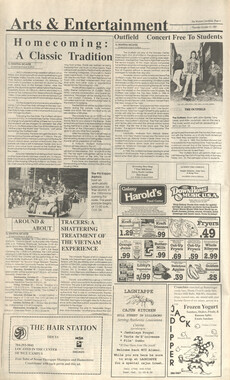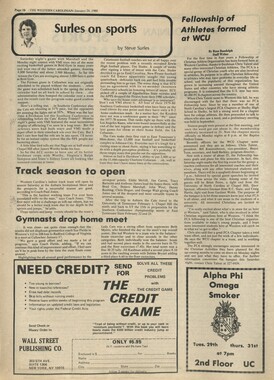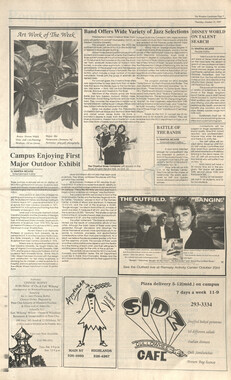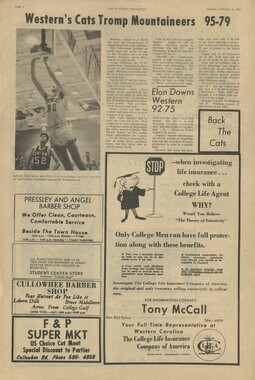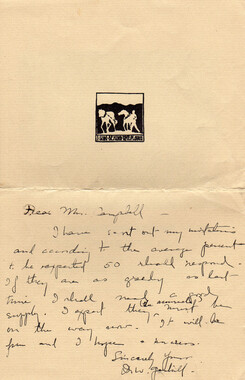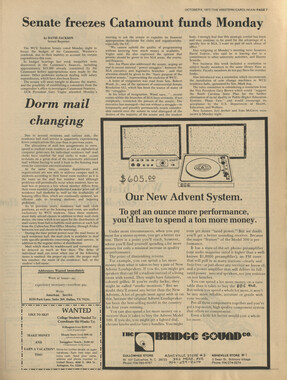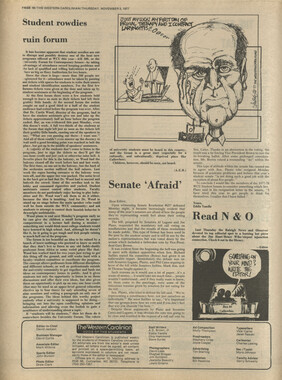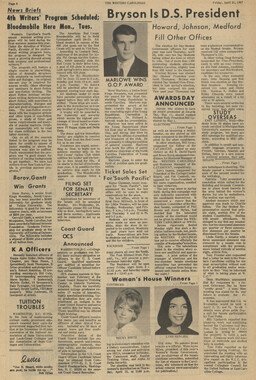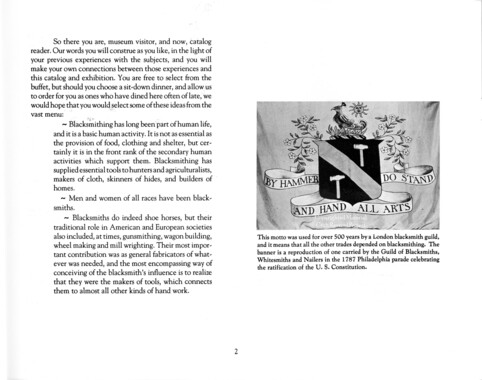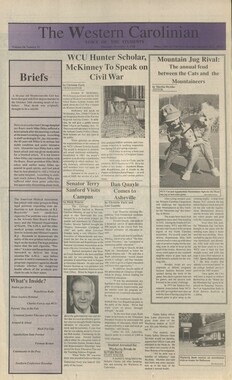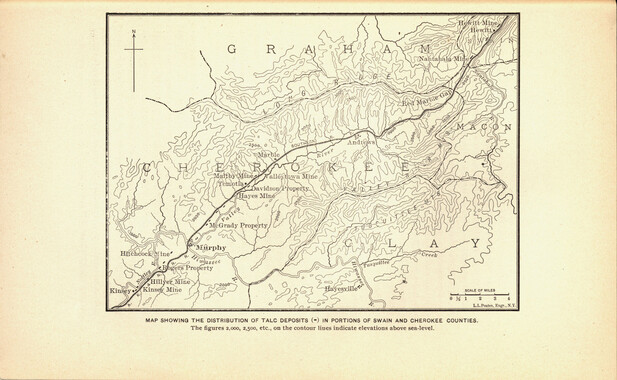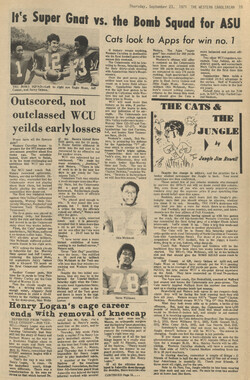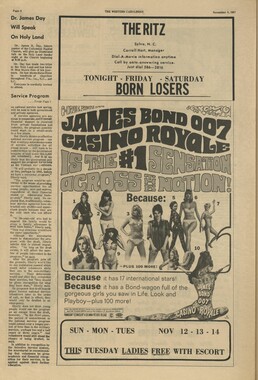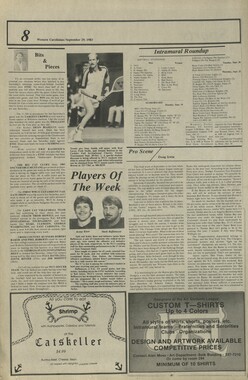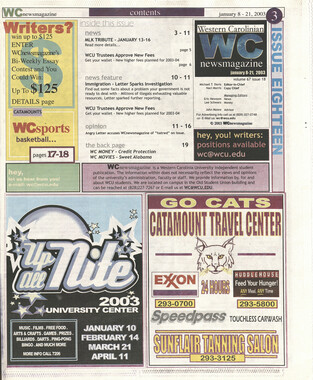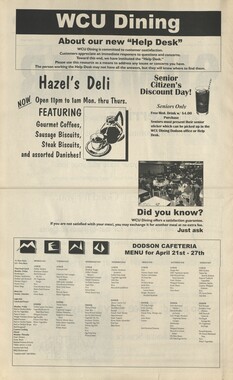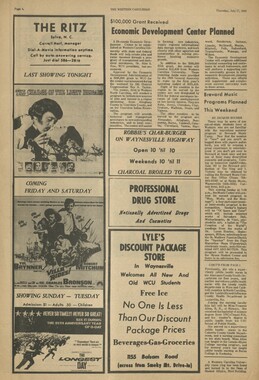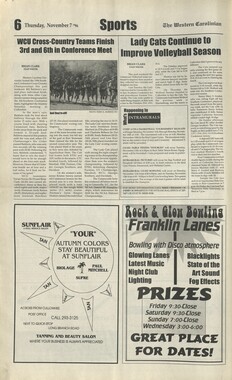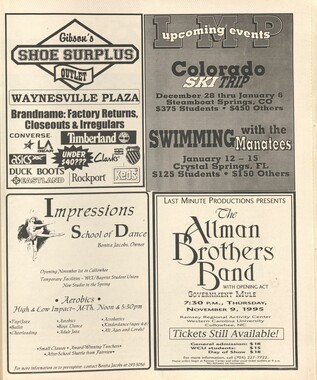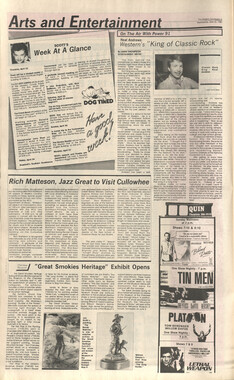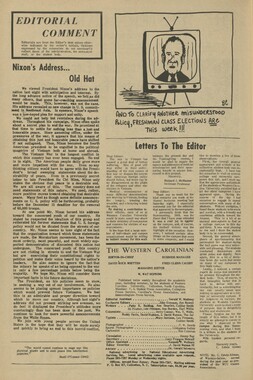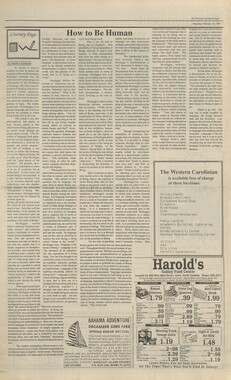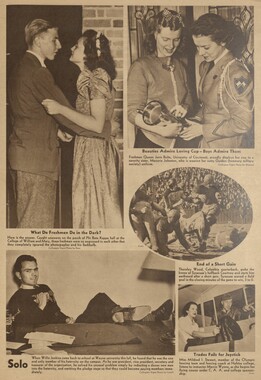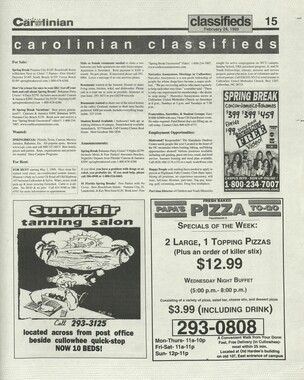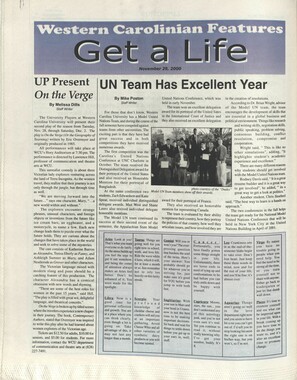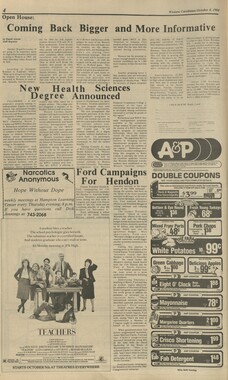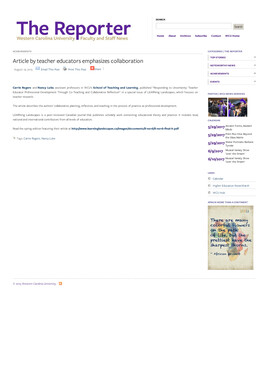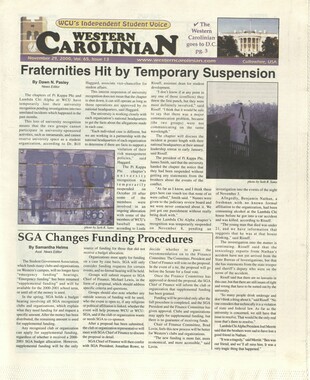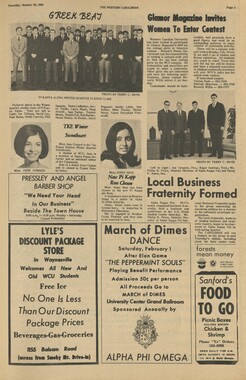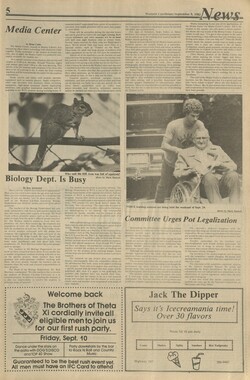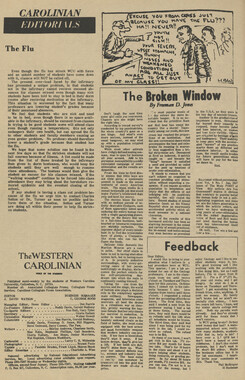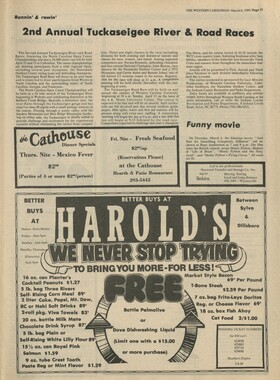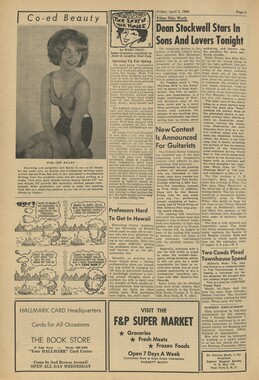Western Carolina University (20)
View all
- Canton Champion Fibre Company (2308)
- Cherokee Traditions (293)
- Civil War in Southern Appalachia (165)
- Craft Revival (1942)
- Great Smoky Mountains - A Park for America (2767)
- Highlights from Western Carolina University (430)
- Horace Kephart (941)
- Journeys Through Jackson (154)
- LGBTQIA+ Archive of Jackson County (26)
- Oral Histories of Western North Carolina (314)
- Picturing Appalachia (6772)
- Stories of Mountain Folk (413)
- Travel Western North Carolina (160)
- Western Carolina University Fine Art Museum Vitreograph Collection (129)
- Western Carolina University Herbarium (92)
- Western Carolina University: Making Memories (708)
- Western Carolina University Publications (2283)
- Western Carolina University Restricted Electronic Theses and Dissertations (146)
- Western North Carolina Regional Maps (71)
- World War II in Southern Appalachia (131)
University of North Carolina Asheville (6)
View all
- Allanstand Cottage Industries (62)
- Appalachian National Park Association (53)
- Bennett, Kelly, 1890-1974 (1388)
- Berry, Walter (76)
- Brasstown Carvers (40)
- Carver, George Washington, 1864?-1943 (26)
- Cathey, Joseph, 1803-1874 (1)
- Champion Fibre Company (233)
- Champion Paper and Fibre Company (297)
- Cherokee Indian Fair Association (16)
- Cherokee Language Program (22)
- Crowe, Amanda (40)
- Edmonston, Thomas Benton, 1842-1907 (7)
- Ensley, A. L. (Abraham Lincoln), 1865-1948 (275)
- Fromer, Irving Rhodes, 1913-1994 (70)
- George Butz (BFS 1907) (46)
- Goodrich, Frances Louisa (120)
- Grant, George Alexander, 1891-1964 (96)
- Heard, Marian Gladys (60)
- Kephart, Calvin, 1883-1969 (15)
- Kephart, Horace, 1862-1931 (313)
- Kephart, Laura, 1862-1954 (39)
- Laney, Gideon Thomas, 1889-1976 (439)
- Masa, George, 1881-1933 (61)
- McElhinney, William Julian, 1896-1953 (44)
- Niggli, Josephina, 1910-1983 (10)
- North Carolina Park Commission (105)
- Osborne, Kezia Stradley (9)
- Owens, Samuel Robert, 1918-1995 (11)
- Penland Weavers and Potters (36)
- Roberts, Vivienne (15)
- Roth, Albert, 1890-1974 (142)
- Schenck, Carl Alwin, 1868-1955 (1)
- Sherrill's Photography Studio (2565)
- Southern Highland Handicraft Guild (127)
- Southern Highlanders, Inc. (71)
- Stalcup, Jesse Bryson (46)
- Stearns, I. K. (213)
- Thompson, James Edward, 1880-1976 (226)
- United States. Indian Arts and Crafts Board (130)
- USFS (683)
- Vance, Zebulon Baird, 1830-1894 (1)
- Weaver, Zebulon, 1872-1948 (58)
- Western Carolina College (230)
- Western Carolina Teachers College (282)
- Western Carolina University (1794)
- Western Carolina University. Mountain Heritage Center (18)
- Whitman, Walt, 1819-1892 (10)
- Wilburn, Hiram Coleman, 1880-1967 (73)
- Williams, Isadora (3)
- Cain, Doreyl Ammons (0)
- Crittenden, Lorraine (0)
- Rhodes, Judy (0)
- Smith, Edward Clark (0)
- Appalachian Region, Southern (2399)
- Asheville (N.C.) (1917)
- Avery County (N.C.) (26)
- Blount County (Tenn.) (161)
- Buncombe County (N.C.) (1671)
- Cherokee County (N.C.) (283)
- Clay County (N.C.) (555)
- Graham County (N.C.) (233)
- Great Smoky Mountains National Park (N.C. and Tenn.) (510)
- Haywood County (N.C.) (3522)
- Henderson County (N.C.) (70)
- Jackson County (N.C.) (4692)
- Knox County (Tenn.) (25)
- Knoxville (Tenn.) (12)
- Lake Santeetlah (N.C.) (10)
- Macon County (N.C.) (420)
- Madison County (N.C.) (211)
- McDowell County (N.C.) (39)
- Mitchell County (N.C.) (132)
- Polk County (N.C.) (35)
- Qualla Boundary (981)
- Rutherford County (N.C.) (76)
- Swain County (N.C.) (2113)
- Transylvania County (N.C.) (247)
- Watauga County (N.C.) (12)
- Waynesville (N.C.) (73)
- Yancey County (N.C.) (72)
- Aerial Photographs (3)
- Aerial Views (60)
- Albums (books) (4)
- Articles (1)
- Artifacts (object Genre) (228)
- Bibliographies (1)
- Biography (general Genre) (2)
- Cards (information Artifacts) (38)
- Clippings (information Artifacts) (191)
- Crafts (art Genres) (622)
- Depictions (visual Works) (21)
- Design Drawings (1)
- Drawings (visual Works) (184)
- Envelopes (73)
- Facsimiles (reproductions) (1)
- Fiction (general Genre) (4)
- Financial Records (12)
- Fliers (printed Matter) (67)
- Glass Plate Negatives (381)
- Guidebooks (2)
- Internegatives (10)
- Interviews (812)
- Land Surveys (102)
- Letters (correspondence) (1013)
- Manuscripts (documents) (619)
- Maps (documents) (177)
- Memorandums (25)
- Minutes (administrative Records) (59)
- Negatives (photographs) (5835)
- Newsletters (1285)
- Newspapers (2)
- Occupation Currency (1)
- Paintings (visual Works) (1)
- Pen And Ink Drawings (1)
- Periodicals (193)
- Personal Narratives (10)
- Photographs (12976)
- Plans (maps) (1)
- Poetry (7)
- Portraits (1960)
- Postcards (329)
- Programs (documents) (151)
- Publications (documents) (2237)
- Questionnaires (65)
- Scrapbooks (282)
- Sheet Music (2)
- Slides (photographs) (402)
- Songs (musical Compositions) (2)
- Sound Recordings (796)
- Specimens (92)
- Speeches (documents) (15)
- Tintypes (photographs) (8)
- Transcripts (322)
- Video Recordings (physical Artifacts) (23)
- Vitreographs (129)
- Text Messages (0)
- A.L. Ensley Collection (275)
- Appalachian Industrial School Records (7)
- Appalachian National Park Association Records (336)
- Axley-Meroney Collection (2)
- Bayard Wootten Photograph Collection (20)
- Bethel Rural Community Organization Collection (7)
- Blumer Collection (5)
- C.W. Slagle Collection (20)
- Canton Area Historical Museum (2110)
- Carlos C. Campbell Collection (282)
- Cataloochee History Project (65)
- Cherokee Studies Collection (4)
- Daisy Dame Photograph Album (5)
- Daniel Boone VI Collection (1)
- Doris Ulmann Photograph Collection (112)
- Elizabeth H. Lasley Collection (1)
- Elizabeth Woolworth Szold Fleharty Collection (4)
- Frank Fry Collection (95)
- George Masa Collection (173)
- Gideon Laney Collection (452)
- Hazel Scarborough Collection (2)
- Hiram C. Wilburn Papers (28)
- Historic Photographs Collection (236)
- Horace Kephart Collection (861)
- Humbard Collection (33)
- Hunter and Weaver Families Collection (1)
- I. D. Blumenthal Collection (4)
- Isadora Williams Collection (4)
- Jesse Bryson Stalcup Collection (47)
- Jim Thompson Collection (224)
- John B. Battle Collection (7)
- John C. Campbell Folk School Records (80)
- John Parris Collection (6)
- Judaculla Rock project (2)
- Kelly Bennett Collection (1407)
- Love Family Papers (11)
- Major Wiley Parris Civil War Letters (3)
- Map Collection (12)
- McFee-Misemer Civil War Letters (34)
- Mountain Heritage Center Collection (4)
- Norburn - Robertson - Thomson Families Collection (44)
- Pauline Hood Collection (7)
- Pre-Guild Collection (2)
- Qualla Arts and Crafts Mutual Collection (12)
- R.A. Romanes Collection (681)
- Rosser H. Taylor Collection (1)
- Samuel Robert Owens Collection (94)
- Sara Madison Collection (144)
- Sherrill Studio Photo Collection (2558)
- Smoky Mountains Hiking Club Collection (616)
- Stories of Mountain Folk - Radio Programs (374)
- The Reporter, Western Carolina University (510)
- Venoy and Elizabeth Reed Collection (16)
- WCU Gender and Sexuality Oral History Project (32)
- WCU Mountain Heritage Center Oral Histories (25)
- WCU Oral History Collection - Mountain People, Mountain Lives (71)
- WCU Students Newspapers Collection (1744)
- Western North Carolina Tomorrow Black Oral History Project (69)
- William Williams Stringfield Collection (2)
- Zebulon Weaver Collection (109)
- African Americans (390)
- Appalachian Trail (35)
- Artisans (521)
- Cherokee art (84)
- Cherokee artists -- North Carolina (10)
- Cherokee language (21)
- Cherokee pottery (101)
- Cherokee women (208)
- Church buildings (167)
- Civilian Conservation Corps (U.S.) (110)
- College student newspapers and periodicals (1830)
- Dams (103)
- Dance (1023)
- Education (222)
- Floods (61)
- Folk music (1015)
- Forced removal, 1813-1903 (2)
- Forest conservation (220)
- Forests and forestry (1058)
- Gender nonconformity (4)
- Great Smoky Mountains National Park (N.C. and Tenn.) (181)
- Hunting (38)
- Landscape photography (10)
- Logging (103)
- Maps (84)
- Mines and mineral resources (8)
- North Carolina -- Maps (18)
- Paper industry (38)
- Postcards (255)
- Pottery (135)
- Railroad trains (71)
- Rural electrification -- North Carolina, Western (3)
- School integration -- Southern States (2)
- Segregation -- North Carolina, Western (5)
- Slavery (5)
- Sports (452)
- Storytelling (245)
- Waterfalls -- Great Smoky Mountains (N.C. and Tenn.) (66)
- Weaving -- Appalachian Region, Southern (280)
- Wood-carving -- Appalachian Region, Southern (328)
- World War, 1939-1945 (173)
Western Carolinian Volume 47 Number 16
Item
Item’s are ‘child’ level descriptions to ‘parent’ objects, (e.g. one page of a whole book).
-
-
Spring Special Edition Mud Bowl Photo Story Leisure Stephen Gaskin and The Farm Community Page 10 Basketball Action and Photos Sports Voice of the Students and University Community Volume 47 Issue 16 Western Carolinian/January 17, 1983 Free ] $485,000 Donated By The Hennessees Bft^L ^*L ■ V.'tie« ";«> i^mEm^Mmmkmmmm^ The largest gift ever made to Western Carolina University—212 acres of lake front property valued at $485,000—was made by Mr. and Mrs. W.C. Hennessee of Sylva. The property is located on Bear Lake in the southern end of Jackson County in southwestern North Carolina. The appraised value of the land "clearly establishes this gift as the most magnanimous ever made to Western Carolina University," Dr. H.F. Robinson, WCU chancellor said. The property will be held in the WCU Endowment Fund pending development of plans for its use, Robinson said. Hennessee said he hopes the university will utilize the property, either for development or as an investment NSF Grant to Math Dept. The National Science Foundation (NSF) has awarded Western Carolina University an $86,000 computer system and a $1,600 grant to train high school teachers to teach an advanced placement course in computer science. The award to WCU's department of mathematics is the largest made by NSF in a pioneer project'involving 58 American colleges and universities and the donation of nearly $1 million in computing equipment by private industry. Under the NSF project, researchers at the selected institutions will explore ways to use computers to improve science and engineering education at the high school and early college levels. "There is a critical shortage of teachers trained to use computers intelligently in our high schools," said Dr. Charles Martin, head of WCU's mathematics department. "With this program, we hope to train about 138 teachers atid 90 students. This should generate a higher level of computing at the high school level and also stimulate more interest in science and math courses." The program, which begins in January, will include annual spring and summer institutes to train high school teachers throughout the Southeast to teach the Advanced Placement (AP) Computer Science course sponsored by the College Board, an agency that sponsors various educational programs, such as the Scholastic Achievement Test. Teachers who successfully complete the program will be expected to teach the AP course in their respective schools. The computer science course, which is the newest AP course sponsored by the College Board, covers topics that normally comprise six or more semester hours of college-level computer science coursework. As a result, high school students with AP credit may receive. advanced placement in computer science and/or credit toward a computer science or other degree at most colleges and universities. Martin said the placement of more students directly into sophomore-level computer science courses should relieve universities such as WCU which are experiencing swelling enrollments in introductory programming courses. He said some 31,000 students nationwide are expected to take the course within the next two to three years. The first examination for the course is scheduled for May 1984. Computer equipment needed for 52 of the 58 national projects has been donated by Radio Shack, Atari Institute for Educational Action-Research, Digital Equipment Corporation, IBM Corporation and Apple Education Foundation. Each company also will provide free technical assistance and information. The largest industrial gift, a state-of-the-art Digital Equipment Corporation computer system with sophisticated graphics capabilities and a slide projections unit, went to WCU. Martin said the(VAC 11/730) computer equipment, NSF grant and $21,000 in matching funds from the university will be used to conduct the three-year pilot program. to page 13 from Which revenues can be realized, "in the long-term best interests of the. students and faculty." Robinson said the gift is especially significant "as we face the prospects of general reductions in government spending for public higher education." Hennessee came to Jackson County in 1934 from Tennessee and founded W.C. Hennessee Lumber Company, one of the country's leading hardwood producers and the world's largest producer of wormy chestnut, a wood valued for interior walls and decorative uses. The company in 1980 merged with Hammermill Paper Company, the second largest hardwood company in the United States. The gift of the Bear Lake property is the second major gift of land by members of the Hennessee family. In 1980, Mr. and Mrs. Hennessee's son and daughter-in- law, Mr. and Mrs. Jack M. Hennessee. gave the WCU Development Foundation 400 acres of land, valued ai more than $146,000, in the Shutin Creek area of Jacksor County, about five miles east of Cherokee. "It is our hope that the university can utilize this property, either for development or as an investment from which revenues can be realized, in the long-term best interests of the students and faculty. "Western Carolina University is one of the major resources of our county and the entire western part of North Carolina, and we are glad that we can have some part in helping to expand its service to this region," Hennessee said Robinson, who joined the Hennessees in annoucing the gift, said Mr. and Mrs. Hennessee "belong in that top circle of individuals and corporations whose financial support of Western Carolina Universtiy is so crucial in helping the university to meet the responsibility for providing a superior level of higher education. "As wc face the prospects of general reductions in government spending for public higher education, the support of leaders in the private sector takes on added significance. We are extremely proud that two of the region's leading citizens have stepped forth in this splendid manner to demonstrate their support for the university." Robinson continued "I personally appreciate this vote of confidence in the administration and in the university." \JL J05V ,4 ■ _*-■ ■^I0%-- r«*. ,• f T-\ > ' *fc ATTENTION There will be a staff meeting Monday Jan. 24 at 5 p.m. in the Carolinian office. | All those interested in staying with or joining the staff of the Western Carolinian please attend this meeting. WCU Med. Record Student scores 2nd highest in nation f\ 1982 Western Carolina University graduate posted the nation's second highest score on the American Medical Record Association's registration examination and a survey of all of WCU's School of Nursing and Health Sciences graduates showed an across the board increase in success on professional licensure and certification examinations. According to the survey, 100 percent of WCU's 1982 graduates in emergency medical care, in environmental health, and in medical record administration passed their respective professional licensure exams. Ninety-three percent passed the rigorous national registry exam in medical technology and 93 percent of the university's nursing graduates passed the licensure exam. Ms. Cathy Tobias Mushock, a 1982 graduate in medical record administration, scored 239 points of a possible 250 on the AMR A national registry exam. That score was just one point off the top national score of 240. Ms. Mushock, who lives at 725 W. SumpterSt. in Shelby, is assistant director of medical records at Cleveland Memorial Hospital. Not surprisingly, Ms. Bonita Turman, director of WCU's medical record administration program, scored the highest national score on the AMRA exam in 1979, after graduating from Seattle University. "Western students historically have done well on the national exams," Turman said, "due in large part to their own study and the help of our clinical hospital affiliates." Dan Southern, director of the medical technology program, was elated over the success of his 1982 graduates. That program had averaged a passing rate of about 75 percent for the last four years on the Board of Registry Examination of the American Society of Clinical Pathologists. Western graduates are now urged to take both the ASCP board exam and the exam Winter finally struck Cullowhee last week when snow capped the mountains and filled the coves. AM in all, a beautiful sight to behold photo by Mark Haskett Youth Corps Collection The U.S. Youth Adult Conservation Corps of the Blue Ridge Parkway cleared its last fallen tree this year, after getting axed by the Reagan Administration. But the history of the defunct youth employment program is certain to remain standing. Thanks to a donation by the Blue Ridge Parkway, Western Carolina University is preserving the program's five-year history in a special collection comprising the corps' administrative papers. The collection, housed in the special collections department of WCU's Hunter Library, "will insure that the papers be maintained in perpetuity for use by scholars in years to come," said Ray Brotherton, assistant superintendent of the parkway. The YACC program, which offered youngsters a year's work in the outdoors, started in 1977 with 50 nonresidential camps in the United States. It was the Carter administration's version of the Depression-born Civil Conservation Corps which, at its peak, had over 500,000 young men, living in camps and working under the supervision of the Army. Camp 2172 of the Blue Ridge Parkway YACC was the first operating corps in the nation, employing men and women ages 16-23. These youth worked alongside experienced personnel, clearing fallen trees, draining swamps, laying water lines, repairing rail fences and clearing drains along the 469 miles of the National Park Service's scenic highway which, by coincidence, was built .by the CCC in the 1930s. "The idea was iq train young people and give them some marketable skills so they could get jobs in the private sector," said Brotherton. The administrative records of the Blue Ridge Parkway camp, which fill nearly four filing drawers, include administrative handbooks, copies of The Bugle camp newsletter and various files on personnel, budget, payroll, travel, energy and conservation surveys, and correspondances from the camp's office in Vinton, Va., now closed. "Since two of our main subject areas are wilderness and conservation, these papers from the Blue Ridge Parkway are exactly the kind of documents we are interested in acquiring," said Dr. James Lloyd, curator of WCU's special collections department. Lloyd said the collection should be of particular interest to students and researchers in the university's parks and recreation management program. He said the department is preparing a descriptive index of the papers to be completed by June 1983. administered by the National Certification Agency for Medical Laboratory Personnel. "Several things led to our dramatic improvement," Southern said. "First, the clinical labs in our affiliate hospitals have done a tremendous job and so have faculty members Norma Cook and Mary Edwards. Second, we have instituted better selective admission at the junior level. And third, we have, as a result of employer and graduate feedback, made curriculum changes, adding courses like advanced hematology and clinical biochemistry." Western students receive clinical training at St. Joseph's Hospital and Veterans Medical Center in Asheville, Margaret Pardee Hospital in Hendersonville, Haywood County Hospital in Waynesville, C.J. Harris Hospital in Sylva, Greensboro Humana Corp. Hospital and Grace Hospital in Morganton. Unlike some professions where the jobs are tight, jobs for medical technologists in North Carolina far exceed the number of graduating medical technologists, according to Southern. The same is true on the national level. The WCU program produced 13 graduates in that difficult field in 1982. "Without hesitation, I can say that I know every graduate we turn out knows more than any of us," Southern said. "It is our job to turn out competent generalists who are well versed in up-to-date hematology, immunology, biochemistry and microbiology. It's the nature of the medical technology that as one progresses in one's career, specialization occurs. Medical techologists have difficulty remaining up-to-date in four areas and usually concentrate on one. "But, judging from these national registry results, we're getting them started with a solid foundation. That's very pleasing," Southern said.
Object
Object’s are ‘parent’ level descriptions to ‘children’ items, (e.g. a book with pages).
-
The Western Carolinian is Western Carolina University's student-run newspaper. The paper was published as the Cullowhee Yodel from 1924 to 1931 before changing its name to The Western Carolinian in 1933.
-
